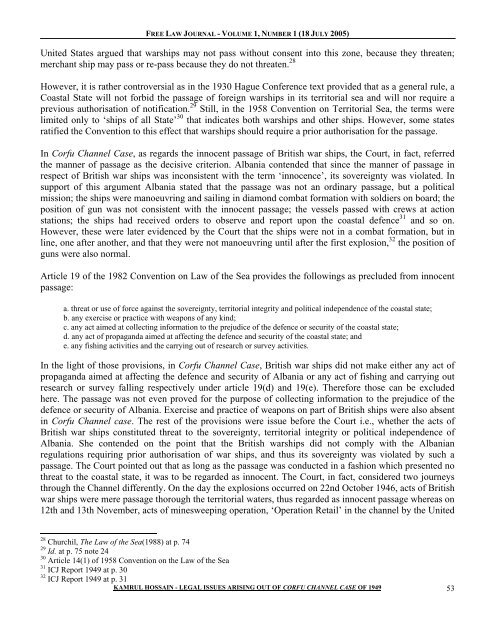Free_Law_Journal-Vol.. - Free World Publishing Inc.
Free_Law_Journal-Vol.. - Free World Publishing Inc.
Free_Law_Journal-Vol.. - Free World Publishing Inc.
You also want an ePaper? Increase the reach of your titles
YUMPU automatically turns print PDFs into web optimized ePapers that Google loves.
FREE LAW JOURNAL - VOLUME 1, NUMBER 1 (18 JULY 2005)<br />
United States argued that warships may not pass without consent into this zone, because they threaten;<br />
merchant ship may pass or re-pass because they do not threaten. 28<br />
However, it is rather controversial as in the 1930 Hague Conference text provided that as a general rule, a<br />
Coastal State will not forbid the passage of foreign warships in its territorial sea and will nor require a<br />
previous authorisation of notification. 29 Still, in the 1958 Convention on Territorial Sea, the terms were<br />
limited only to ‘ships of all State’ 30 that indicates both warships and other ships. However, some states<br />
ratified the Convention to this effect that warships should require a prior authorisation for the passage.<br />
In Corfu Channel Case, as regards the innocent passage of British war ships, the Court, in fact, referred<br />
the manner of passage as the decisive criterion. Albania contended that since the manner of passage in<br />
respect of British war ships was inconsistent with the term ‘innocence’, its sovereignty was violated. In<br />
support of this argument Albania stated that the passage was not an ordinary passage, but a political<br />
mission; the ships were manoeuvring and sailing in diamond combat formation with soldiers on board; the<br />
position of gun was not consistent with the innocent passage; the vessels passed with crews at action<br />
stations; the ships had received orders to observe and report upon the coastal defence 31 and so on.<br />
However, these were later evidenced by the Court that the ships were not in a combat formation, but in<br />
line, one after another, and that they were not manoeuvring until after the first explosion, 32 the position of<br />
guns were also normal.<br />
Article 19 of the 1982 Convention on <strong>Law</strong> of the Sea provides the followings as precluded from innocent<br />
passage:<br />
a. threat or use of force against the sovereignty, territorial integrity and political independence of the coastal state;<br />
b. any exercise or practice with weapons of any kind;<br />
c. any act aimed at collecting information to the prejudice of the defence or security of the coastal state;<br />
d. any act of propaganda aimed at affecting the defence and security of the coastal state; and<br />
e. any fishing activities and the carrying out of research or survey activities.<br />
In the light of those provisions, in Corfu Channel Case, British war ships did not make either any act of<br />
propaganda aimed at affecting the defence and security of Albania or any act of fishing and carrying out<br />
research or survey falling respectively under article 19(d) and 19(e). Therefore those can be excluded<br />
here. The passage was not even proved for the purpose of collecting information to the prejudice of the<br />
defence or security of Albania. Exercise and practice of weapons on part of British ships were also absent<br />
in Corfu Channel case. The rest of the provisions were issue before the Court i.e., whether the acts of<br />
British war ships constituted threat to the sovereignty, territorial integrity or political independence of<br />
Albania. She contended on the point that the British warships did not comply with the Albanian<br />
regulations requiring prior authorisation of war ships, and thus its sovereignty was violated by such a<br />
passage. The Court pointed out that as long as the passage was conducted in a fashion which presented no<br />
threat to the coastal state, it was to be regarded as innocent. The Court, in fact, considered two journeys<br />
through the Channel differently. On the day the explosions occurred on 22nd October 1946, acts of British<br />
war ships were mere passage thorough the territorial waters, thus regarded as innocent passage whereas on<br />
12th and 13th November, acts of minesweeping operation, ‘Operation Retail’ in the channel by the United<br />
28 Churchil, The <strong>Law</strong> of the Sea(1988) at p. 74<br />
29 Id. at p. 75 note 24<br />
30 Article 14(1) of 1958 Convention on the <strong>Law</strong> of the Sea<br />
31 ICJ Report 1949 at p. 30<br />
32 ICJ Report 1949 at p. 31<br />
KAMRUL HOSSAIN - LEGAL ISSUES ARISING OUT OF CORFU CHANNEL CASE OF 1949 53
















